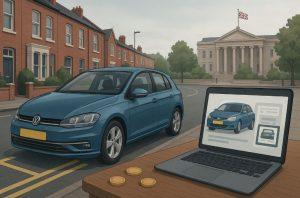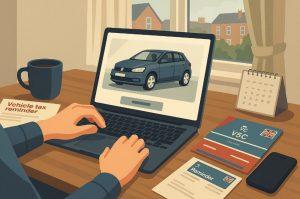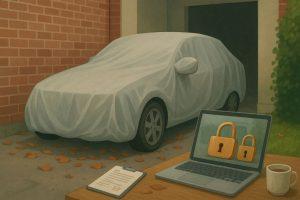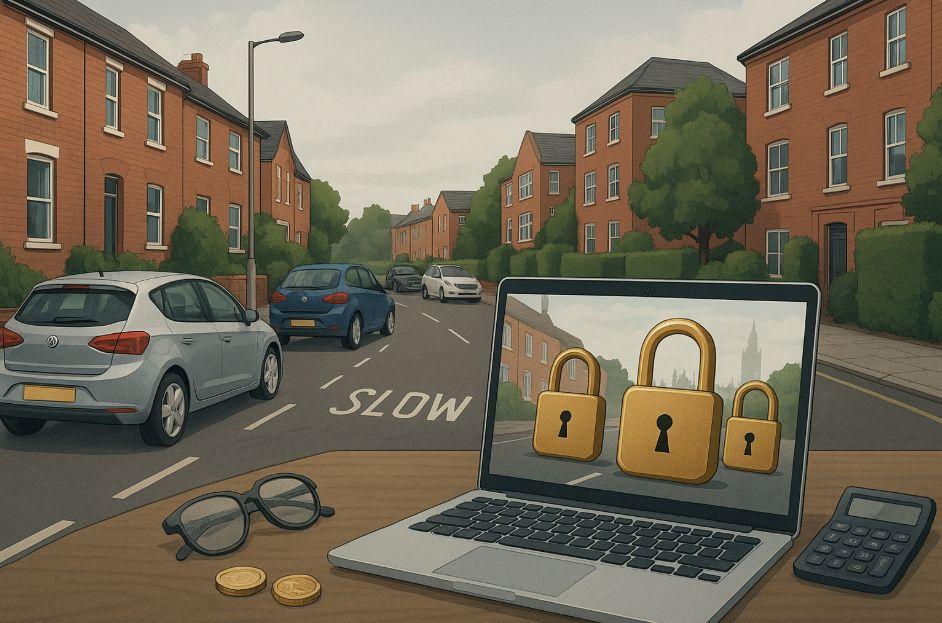Paying DVLA UK road tax, also known as Vehicle Excise Duty (VED), is a legal requirement for most drivers in the UK. Managed by the Driver and Vehicle Licensing Agency (DVLA), this tax helps fund road maintenance and national transport infrastructure.
Whether you’re a Londoner renewing your tax or a new vehicle owner, understanding how to check and pay your road tax is essential for staying compliant and avoiding penalties.
What Is DVLA UK Road Tax?

Road tax is a statutory obligation for vehicles used or parked on public roads in the United Kingdom. The DVLA is responsible for collecting this tax and maintaining records of vehicle compliance. The amount you pay depends on your vehicle’s carbon dioxide (CO2) emissions, fuel type, and registration date.
Without paying this tax, drivers risk severe penalties, including fines up to £1,000 or having their vehicles clamped or impounded. Therefore, staying up to date with your road tax is not only a legal requirement but a crucial step in responsible vehicle ownership.
How Can You Check If Your Vehicle Is Taxed?
To verify whether your car is taxed, the DVLA offers a secure and straightforward online checking service. You’ll need your vehicle registration number to access this feature.
After entering your registration, the tool will display your car’s tax status, MOT expiry date, and other important information. It’s particularly useful when purchasing a used car, confirming recent payments, or checking compliance before a long trip. Ensuring your vehicle is taxed gives peace of mind and helps avoid accidental breaches of the law.
Where Do You Go to Check Your Road Tax Online?
The only trusted place to check your vehicle tax online is the official government portal. The GOV.UK vehicle tax checker is free to use and does not require account registration. Simply enter your registration number, and you’ll see the status of your vehicle’s road tax and MOT instantly.
It’s advisable to avoid third-party websites that mimic the government’s interface, as some may charge unnecessary fees or misuse your data. GOV.UK ensures privacy, reliability, and up-to-date records directly from the DVLA.
What Are the Steps to Pay Your DVLA Road Tax Online?

Paying your road tax online is a convenient process through the GOV.UK website. To begin, you’ll need a reference number from one of the following documents:
- V11 vehicle tax reminder letter
- V5C vehicle registration certificate (log book)
- V5C/2 green slip if you’ve recently bought the vehicle
Once you have a valid reference, visit the tax portal, enter your number, review the vehicle details, and proceed to payment. Accepted payment methods include debit card, credit card, and Direct Debit. After a successful transaction, you’ll receive immediate confirmation, and your vehicle will be legally taxed.
There’s no need for a tax disc anymore enforcement is handled electronically using DVLA’s national records and roadside number plate recognition systems.
Can You Set Up a Direct Debit for Road Tax Payments?
Yes, the DVLA allows vehicle owners to set up Direct Debit payments for road tax. This option is particularly helpful for spreading the cost of tax over the year and avoiding missed deadlines.
You can choose to pay monthly, biannually, or annually. However, this is only available if your vehicle has a valid MOT. The Direct Debit is automatically renewed each year unless cancelled, and a reminder is sent prior to the next payment cycle. This method offers convenience and ensures compliance without the need for manual renewals.
What Happens If You Don’t Pay Road Tax on Time?
Failing to pay your road tax can result in serious consequences. The DVLA runs daily checks using automatic number plate recognition (ANPR) technology to identify untaxed vehicles.
If your vehicle is detected without valid tax, you may receive an immediate fine of £80, which can escalate to £1,000 if ignored. Continued non-payment could lead to your car being clamped, towed, or even destroyed. In London, enforcement is strict due to higher vehicle volumes and congestion control.
To avoid such penalties, always ensure your payments are up to date or declare your vehicle as off-road if it’s not in use.
What Is a SORN?

A Statutory Off Road Notification (SORN) is a formal declaration to the DVLA that your vehicle is not being used on public roads. Once registered under SORN, your car becomes exempt from road tax and insurance obligations, though you cannot drive or park it on public highways.
When Should You Declare It?
SORN should be declared if your car is being stored long-term, undergoing repairs, or if you’re planning to take it off the road for any reason. You can apply online using your V5C or V11 reference number. Declaring SORN is free and helps you stay compliant while not incurring unnecessary costs.
Are There Any Discounts or Exemptions for Road Tax?
Not all vehicles require owners to pay full road tax. There are exemptions and discounts available for specific categories:
- Electric vehicles (EVs) producing zero emissions currently qualify for 100% exemption.
- Historic vehicles over 40 years old are also exempt.
- Vehicles used by disabled individuals, and certain adaptations, qualify for reduced or zero rates.
To apply for an exemption, owners must provide proof of eligibility and submit forms through the DVLA. It’s advisable to check criteria regularly as exemptions are subject to periodic government reviews.
How Much Road Tax Will You Need to Pay in the UK?
Road tax rates vary depending on when your car was registered and how much CO2 it emits. For vehicles registered after April 2017, the first-year rate is based on emissions, followed by a standard flat rate in subsequent years. Additional premiums apply to vehicles with a list price over £40,000.
Road Tax Rate Table (Cars registered after April 2017)
| CO2 Emissions (g/km) | First-Year Rate | Standard Rate (From 2nd Year) |
| 0 | £0 | £0 |
| 1–50 | £10 | £190 |
| 51–75 | £30 | £190 |
| 76–90 | £135 | £190 |
| 91–100 | £165 | £190 |
| 101–110 | £185 | £190 |
| 111–130 | £210 | £190 |
| 131–150 | £255 | £190 |
| 151–170 | £645 | £190 |
| 171–190 | £1,040 | £190 |
| 191–225 | £1,565 | £190 |
| 226–255 | £2,220 | £190 |
| Over 255 | £2,745 | £190 |
For vehicles registered before this date, different rules apply, often based on engine size or legacy emissions bands.
How Can You Get Road Tax Reminders from the DVLA?

To help motorists stay compliant, the DVLA offers a free reminder service via email and SMS. Signing up is simple you’ll need your vehicle registration number and your V5C log book reference.
Reminders are usually sent a few weeks before the tax is due, giving you ample time to pay or make changes to your payment method. Opting in ensures you never forget to tax your vehicle, particularly if you’ve set up annual payments or are not using Direct Debit.
How Is Road Tax Revenue Used in the UK?
Many drivers are unaware of where their road tax payments actually go. While it’s often assumed that road tax directly funds the construction and maintenance of public roads, in reality, the money collected often referred to as DVLA vehicle tax is pooled into the government’s general funds.
This revenue supports a wide range of public services, including infrastructure development, environmental initiatives, and improvements to the UK’s transport systems.
Although there is no direct allocation from road tax to road repairs, consistent tax collection enables the government to invest in national transport and environmental goals. Paying your DVLA vehicle tax contributes indirectly to maintaining the infrastructure that keeps the country moving.
Conclusion
Staying on top of your DVLA UK road tax responsibilities is not only a legal obligation but also a matter of financial prudence. With online tools and flexible payment options, checking and paying your road tax has never been easier. Avoiding unnecessary fines, staying road-legal, and using government-approved platforms will protect you as a responsible vehicle owner.
For London drivers, where enforcement is rigorous and compliance is crucial, being proactive is the smartest choice. Set reminders, choose the right payment method, and keep your documents up to date. it’s all part of staying safe and legal on the roads.
FAQs
Is it free to check your road tax status with the DVLA?
Yes, the DVLA offers a free online tool to check your vehicle’s tax and MOT status via GOV.UK.
Can I pay my car tax without receiving a reminder?
Absolutely. You can use your log book (V5C) or green slip (V5C/2) to tax your car online without a V11 reminder.
What should I do if I’ve sold my car but received a tax notice?
Notify the DVLA immediately. You may still be legally responsible until the change of ownership is processed.
Do I need to retax my vehicle every year?
Yes, road tax must be renewed annually unless you’ve set up a recurring Direct Debit.
Are there penalties for late road tax payments?
Yes, you can be fined, and your car may be clamped or removed if you fail to tax it on time.
Can I get a refund if I sell or scrap my car?
Yes, the DVLA will issue a refund for any full months of unused tax remaining once notified.
Is it possible to tax a vehicle at the Post Office?
Yes, many local Post Office branches allow in-person road tax payments using your V5C.









Leave feedback about this